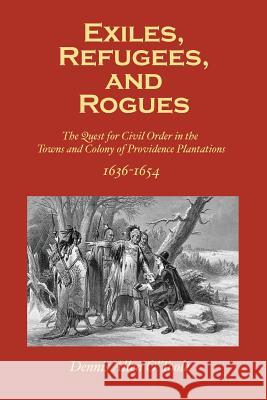Exiles, Refugees and Rogues: The Quest for Civl Order in the Towns and Colony of Providence Plantations 1636-1654 » książka
Exiles, Refugees and Rogues: The Quest for Civl Order in the Towns and Colony of Providence Plantations 1636-1654
ISBN-13: 9781497353282 / Angielski / Miękka / 2014 / 482 str.
Exiles, Refugees and Rogues: The Quest for Civl Order in the Towns and Colony of Providence Plantations 1636-1654
ISBN-13: 9781497353282 / Angielski / Miękka / 2014 / 482 str.
(netto: 86,72 VAT: 5%)
Najniższa cena z 30 dni: 85,56 zł
ok. 13-18 dni roboczych
Dostawa przed świętami

Darmowa dostawa!
The dramatic story of the birth of Rhode Island from 1636 to 1654. With hundreds of original quotes transcribed from early handwritten documents, this insightful analysis by historian Dennis Allen O'Toole makes you feel like you're living in the mid- 1600's, during the blossoming of the State of Rhode Island and Providence Plantations. Learn how the four original towns around Narragansett Bay (Providence, Portsmouth, Newport, and Warwick) coalesced into a union that was without precedent in the history of British Colonial America. Get into the minds of the colorful personalities who made Rhode Island unique: the peace-loving Roger Williams, the ambitious Arnolds (William and Benedict), the proud Anne Hutchinson, the over-grasping William Coddington, the cantankerous Samuel Gorton, the wise John Clarke, and many more. Learn why these settlers risked life and limb in the wilderness to defend their heartfelt principles: religious toleration, separation of church and state, "Democraticall" government, and soul liberty. And find out how they finally succeeded in attaining "as great liberties as any people that we can hear of under heaven." Here are some of the people, places and ideas you'll learn about: People: Roger Williams, John Winthrop, William Coddington, Samuel Gorton, John Clarke, Benedict Arnold, William Arnold, Anne Hutchinson, John Cotton, Sir Henry Vane, Canonicus, Miantonomi, Narragansett Indians, puritans, separatists Places: New England-17th century, colonial, Massachusetts Bay, Plymouth colony, colonial Rhode Island, Providence, Providence Plantations, Portsmouth, Pocasset, New Netherland, Aquidneck Island, Newport, Warwick, Shawomet, Narragansett Bay Ideas: freedom of religion, liberty of conscience, separation of church and state, soul liberty, religious liberty, democracy, popular government, civil order, democratic government, New England towns, English common law, the antinomian controversy











